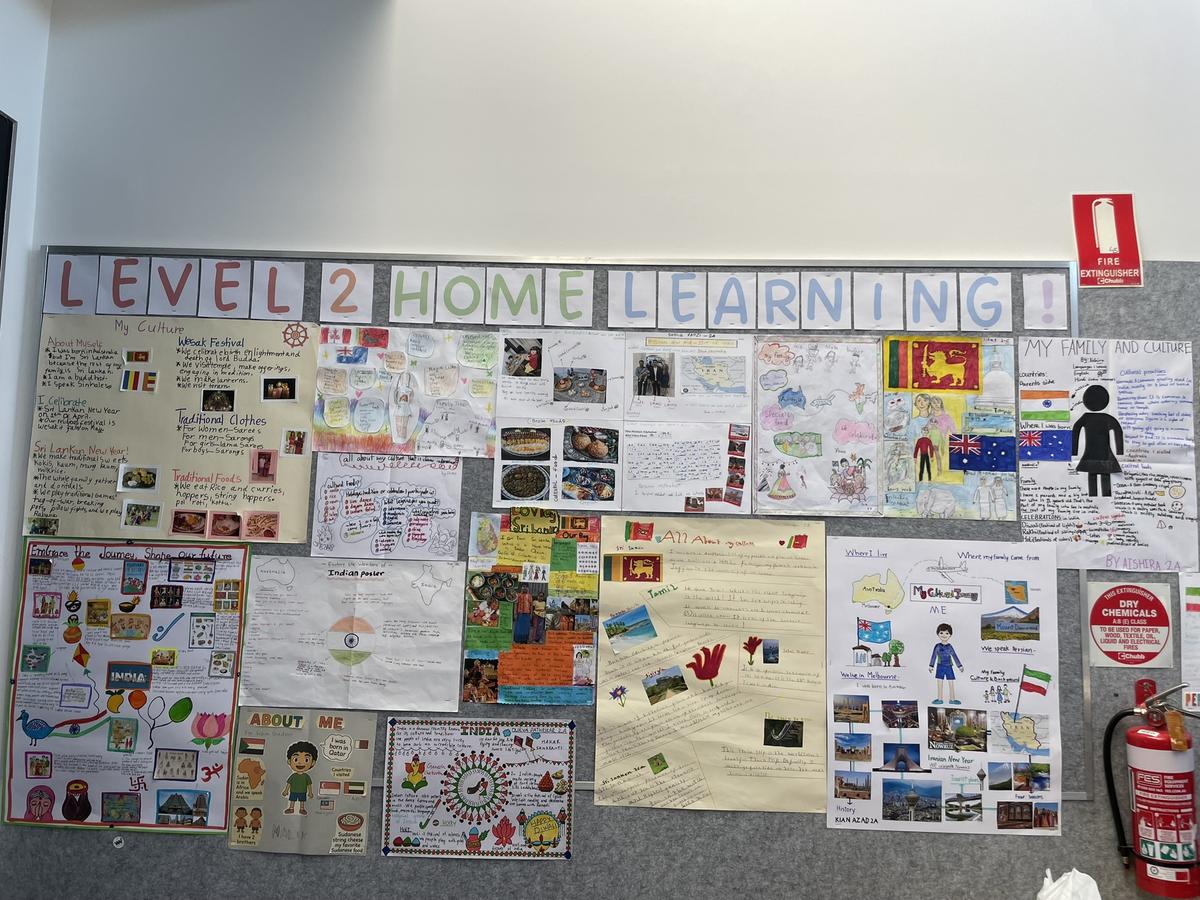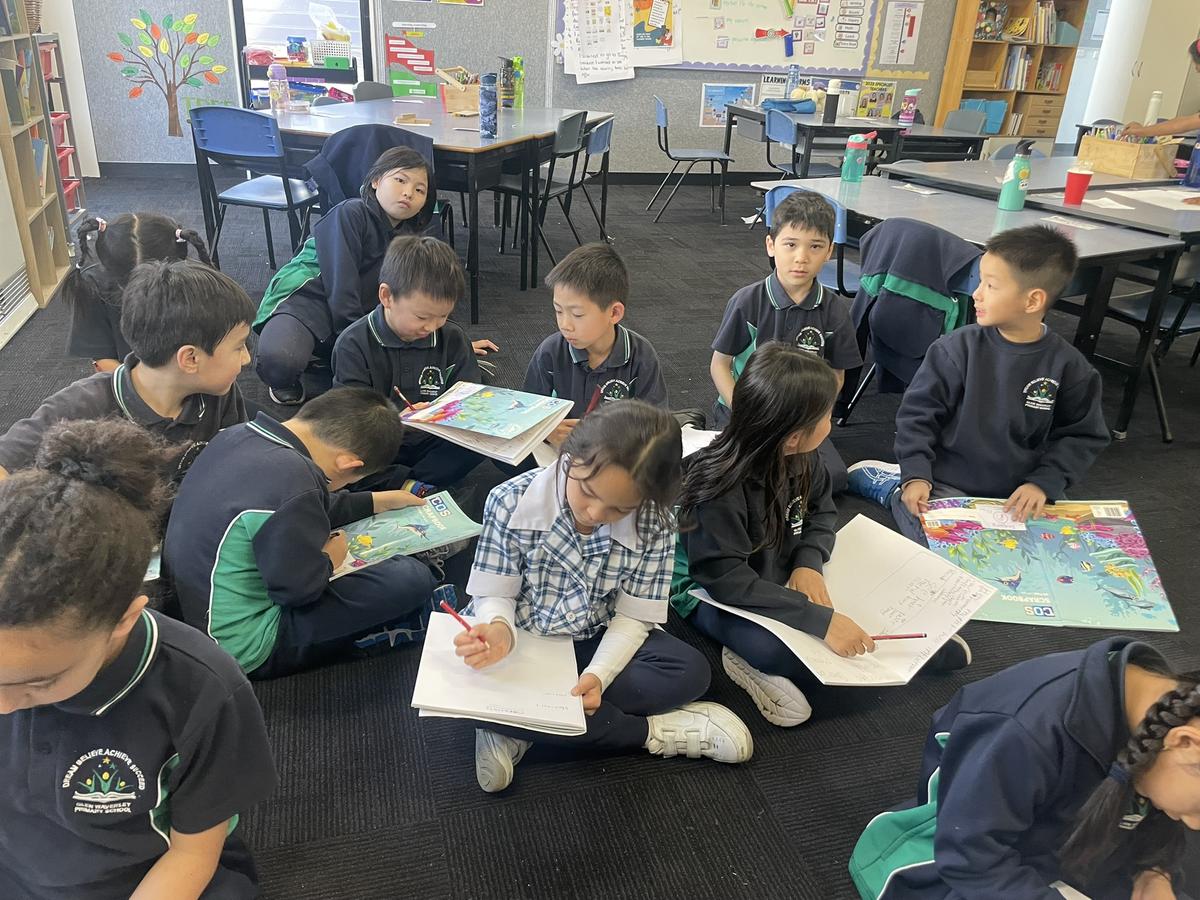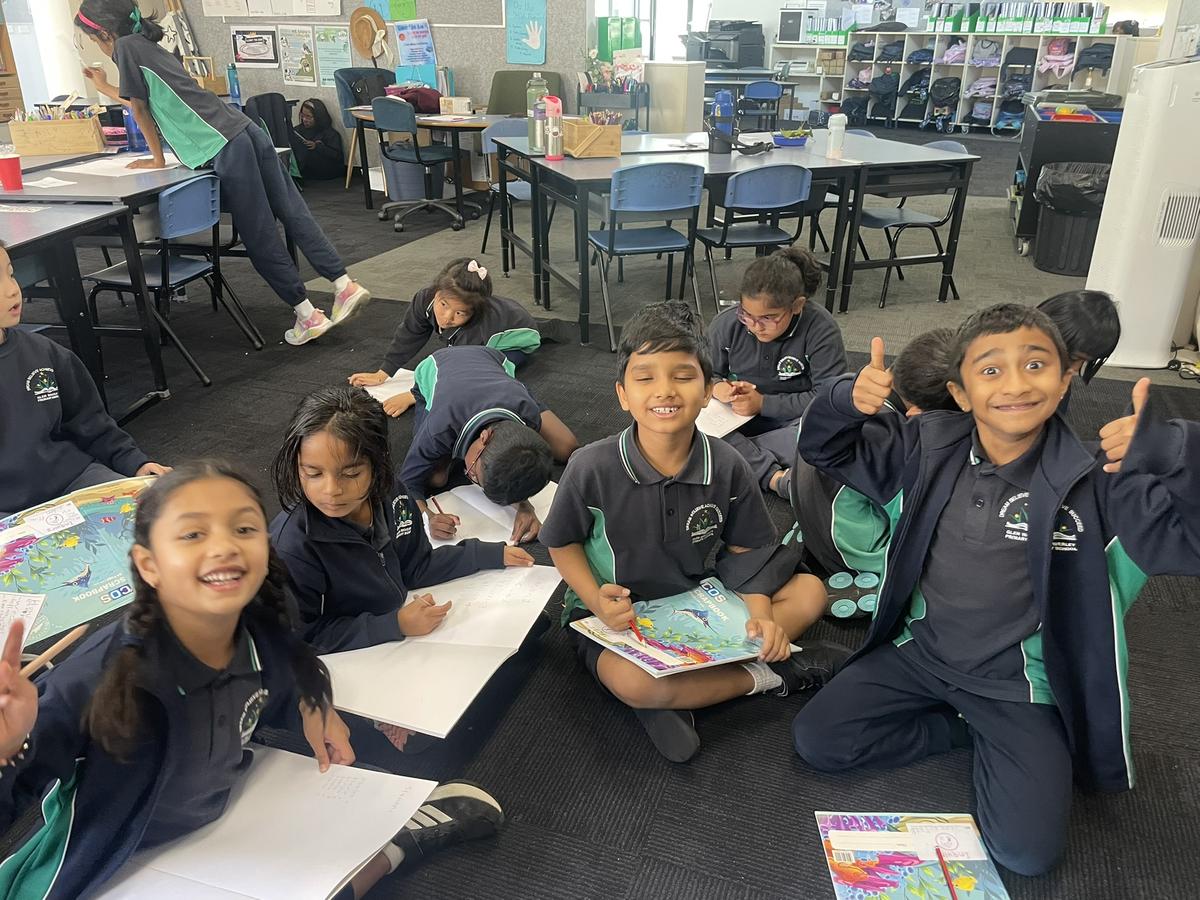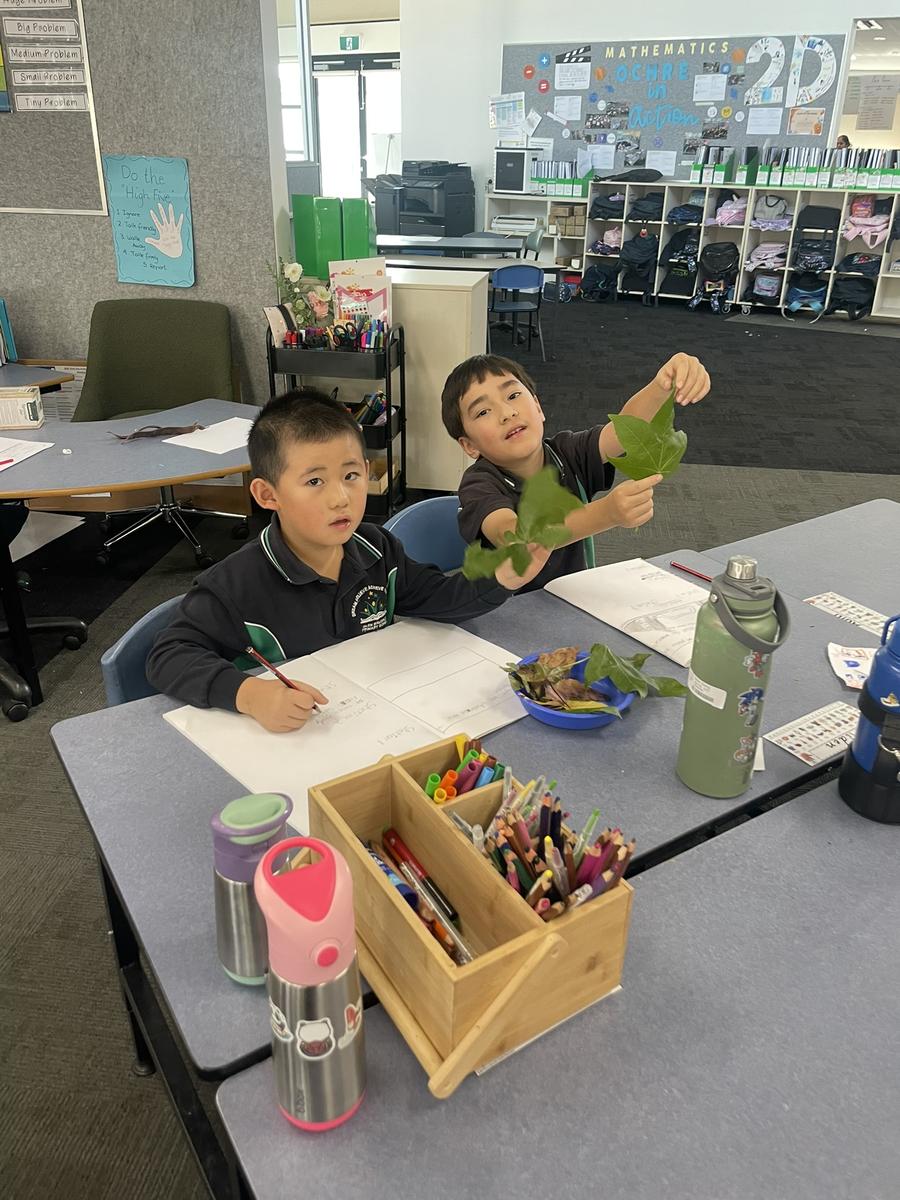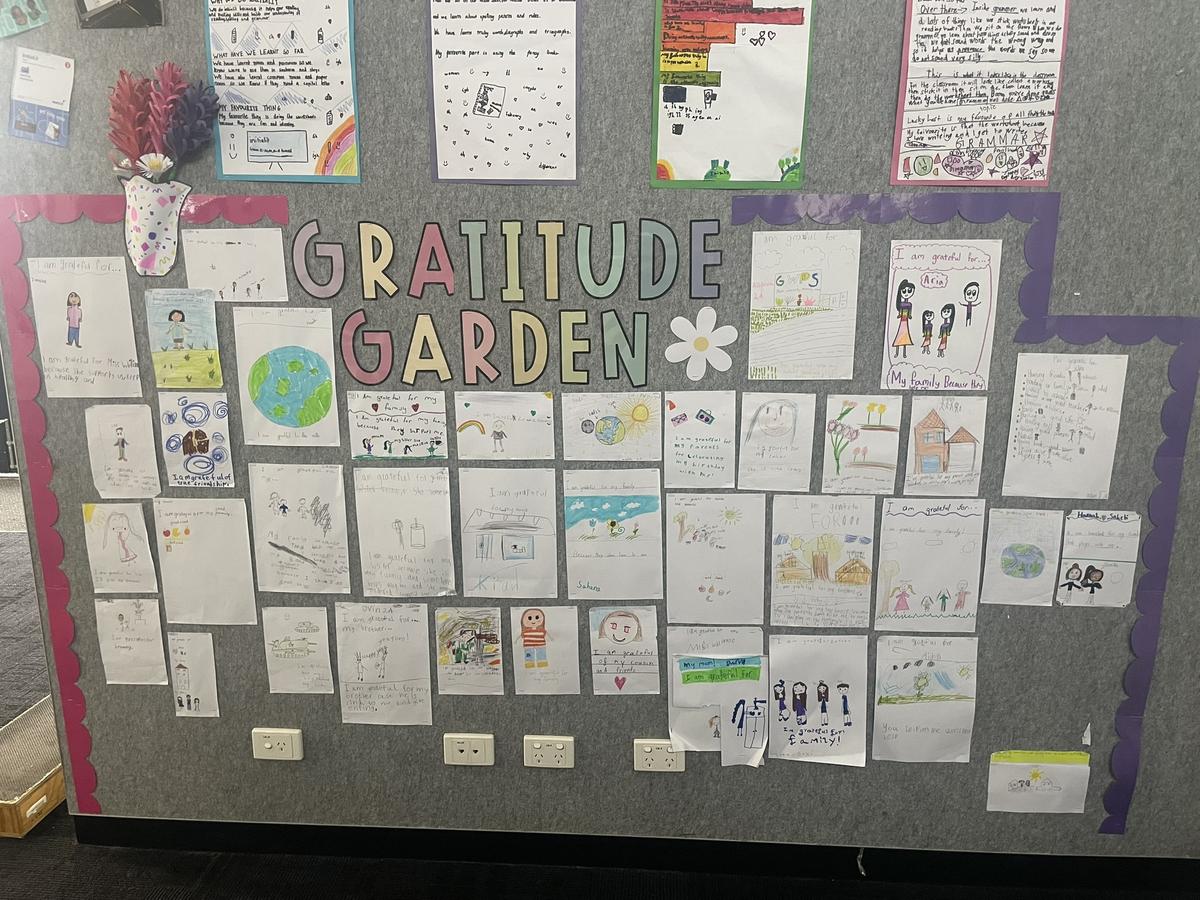Term Three

English
Initial Lit – (Reading and Viewing, Speaking and Listening)
Reading lessons: Students will continue focusing on comprehension and fluency with new vocabulary introduced and discussed each lesson. They will complete a series of related learning experiences connected to the shared text on narrative and informative genres. The students will also be focusing on persuasive texts, asking questions and predicting what will happen in the text.
Spelling lessons: Students will continue to build their phonemic knowledge of sounds this term as well as develop their understanding of suffixes and how they are added to “base words”. They will continue exploring spelling rules for digraphs, trigraphs, long vowels and learn more "Tricky words” that do not follow regular spelling rules. Learners will be encouraged to articulate the sounds and apply them to words within each lesson.
Story Book lessons:While engaging with the Term Three story books, The Stone Lion by Margaret Wild and Collecting Colour by Kylie Dunstan, Year Two students will build upon their vocabulary and speaking and listening skills. They will make predictions and summarise while responding to the texts. Year Two students will build vocabulary and practise using keywords into their own sentences.
Grammar: Students will learn about types of adjectives, like those describing appearance, texture, sound, taste, smell and emotions. Understanding adjectives is crucial as they help enrich writing by providing vivid details and creating a clearer picture in the reader's mind. Students will also learn how to use adjectives both before and after nouns, as well as how to effectively use multiple adjectives separated by commas to add depth to their descriptions. Additionally, they will practice identifying and constructing noun groups, which enhances their ability to structure sentences and communicate ideas more precisely.
To support your child’s learning at home, you can:
- Ensure your child reads every day for 10-15 minutes from their school readers and aloud to an adult or older sibling at least once a week.
- Ask your child what their “Tricky Words” are for the week and test them on spelling these orally.
- Point out and discuss examples of verbs, adverbs, nouns, pronouns and adjectives in books, signs, and other reading materials.
Writing
In Writing, students will investigate and create a range of poetry and information texts, further refining their authorship skills at entertaining and informing. While exploring poetry texts, students will enhance their understanding of how language can be used creatively to express ideas, feelings, and experiences. They will learn about the purpose and structure of different forms of poetry and make connections to real-life concepts through rhythm, rhyme, imagery, and personal expression. While exploring information texts, students will enhance their understanding of how to use accurate and specific language to present facts, describe topics clearly, and explain real-life concepts. They will learn about the purpose and structure of information texts and make connections to real-world examples such as science reports, fact files, and topic-based articles.
To support your child’s learning at home, you can:
- Involve your child in cooking from recipes at home, drawing attention to the single words or phrases that are the instructions.
- Practicing handwriting and letter formation. Encourage your child to write for enjoyment (writing letters, stories) and help them to focus on their handwriting when completing Home Learning tasks.
Speaking and Listening
This term, learners will explore the power of language through poetry. They will engage in reading, writing and performing poems that express thoughts, feelings, and ideas. Learners will experiment with poetic devices such as rhyme, rhythm, repetition, and imagery, and will have opportunities to discuss and reflect on how poems make them feel or what they make them think about.
In Mathematics, learners will be encouraged to similarly reason their answer to explain how they arrived at that conclusion and how they know they are correct. This will ensure learners are using appropriate mathematical language to explain the concepts.
Finally, learners will continue to engage in G.E.M chats throughout the term. This will include building emotional and social skills such as gratitude, empathy, mindfulness and emotional literacy. Through the Resilience Project, learners will engage in short G.E.M chats that focus on a different skill each week. They will be encouraged to reflect on appreciating others and voicing their gratitude aloud.
To support your child’s learning at home, you can:
- Discuss the emotions felt when faced with challenging situations. Explore situations on how to overcome those strategies.
- Ask learners to explain their thinking when completing Home Learning activities.
- Engage in conversation about topics and practice debating both points of view.
Key Vocabulary:
Writing:
- Opinion
- Convince
- Information
- Evidence
- VOICES
Grammar:
- Proper nouns
- Common nouns
- Pronouns
- Adjectives
Spelling:
- Digraph
- Long vowel
- Tricky Words
Mathematics
This term, learners will consolidate their skills in a variety of concepts using hands on materials and investigation. Students will explore and deepen their understanding of data collection. They will use number lines to consolidate skip counting and explore number patterns using concrete materials, multiple representations and game-based learning experiences.
Throughout the rest of this term, learners will be exploring Multiplication and Division using strategies to enhance their understanding such as exploring repeated addition, arrays, and groups as effective methods for solving multiplication and division equations. Applying these strategies will allow the students to gain a solid foundation in these fundamental operations. Additionally, they will have opportunities to solve worded problems and open-ended questions that have real-world applications. This practice will help them transfer their skills and apply mathematical thinking to practical situations.
To support your child’s learning at home, you could:
- Play Maths challenges with a family member, for example, generate an addition or subtraction equation. Race to solve the equation.
- Practice using the addition and subtraction strategies. Encourage your child to explain their chosen strategy.
- Skip Count Walk – When walking, ask your child to skip count by 2s, 5s, 3s, 10s saying the next number each step they take. For an extra challenge, ask your child to start from an odd number.
Key Vocabulary:
- Skip count
- Number pattern
- Number line
- Hundreds chart
- Pattern
- Digit
- Concrete materials
Inquiry
Question: What do places mean to us?
Global Goal:
16. Peace, justice and strong institutions
Summary of Learning:
In Term Three, learners will explore the concepts behind the inquiry question, “What do places mean to us?” Students will be exploring the significance of important landmarks through a local and global lens. They will learn about how different places are important to different people and draw personal connections to places around them. Throughout the term, students will learn about different geographical landmarks and think critically about the contexts around them. We will also make connections to Mathematics and Writing through the focus of geography. As a final transfer, students will choose a landmark that is significant to them and create an informative text to demonstrate their understanding.
Students will embark on an excursion to the Royal Melbourne Botanical Gardens (RBG). This program will also incorporate Indigenous connections.
Key Vocabulary
- Geography, Landmark, Local, Global, Significant, Connection, Location, Heritage, Indigenous.
- How can you support your child’s Inquiry learning at home?
- Explore your family background together and making a family tree at home.
How can you support your child’s Inquiry learning at home?
- Look at the world map and use a pencil to mark the places they have travelled to on the map.
- Ask your child to give directions to familiar places around them verbally/in written form.
Wellbeing
The Resilience Project
In Grade 2 Term 3, we explored The Resilience Project and learning about the importance of Emotional Literacy. Emotional Literacy is the ability to recognize, understand, and express our feelings, and it’s a vital part of building strong, positive relationships and developing resilience.
This term, the students have been engaging in activities to identify their emotions and practice strategies for managing them. Through the group discussions, collaborative and creative tasks, they’ve been learning how to express their feelings in words, listen to others with empathy, and build a toolbox of strategies to calm their minds during challenging times.
One of our favourite activities has been “GEM Chat,” where students focused on fostering positive connections and building emotional awareness. Students shared moments of gratitude, practiced understanding others’ feelings, and engaged in mindful reflection, creating a safe and inclusive environment.
It’s wonderful to see the Grade 2 students becoming more aware of their emotions and developing the confidence to express themselves!
Key Vocabulary:
- Empathy
- Gratitude
- Mindfulness
How can you support your child’s Wellbeing learning at home?
- Showing Gratitude and being grateful for what we have.
- Practicing Mindfulness at home like mindful breathing and colouring.
- Showing Empathy such as being an active listener.
Cyber Safety
In Term 3, the year 2’s will continue their journey navigating through the Cyber Safety Project, with emphasis on safety and integrity. This project will help our students develop essential digital literacy skills, while also encouraging them to think critically about their actions and well-being in the online world. This will include lessons on digital citizenship, respecting others online, and maintaining privacy and security when using technology in the classroom. By the end of Term 3, students will have developed essential skills for navigating both their emotional wellbeing and the digital world safely, helping them to thrive both academically and personal setting.

